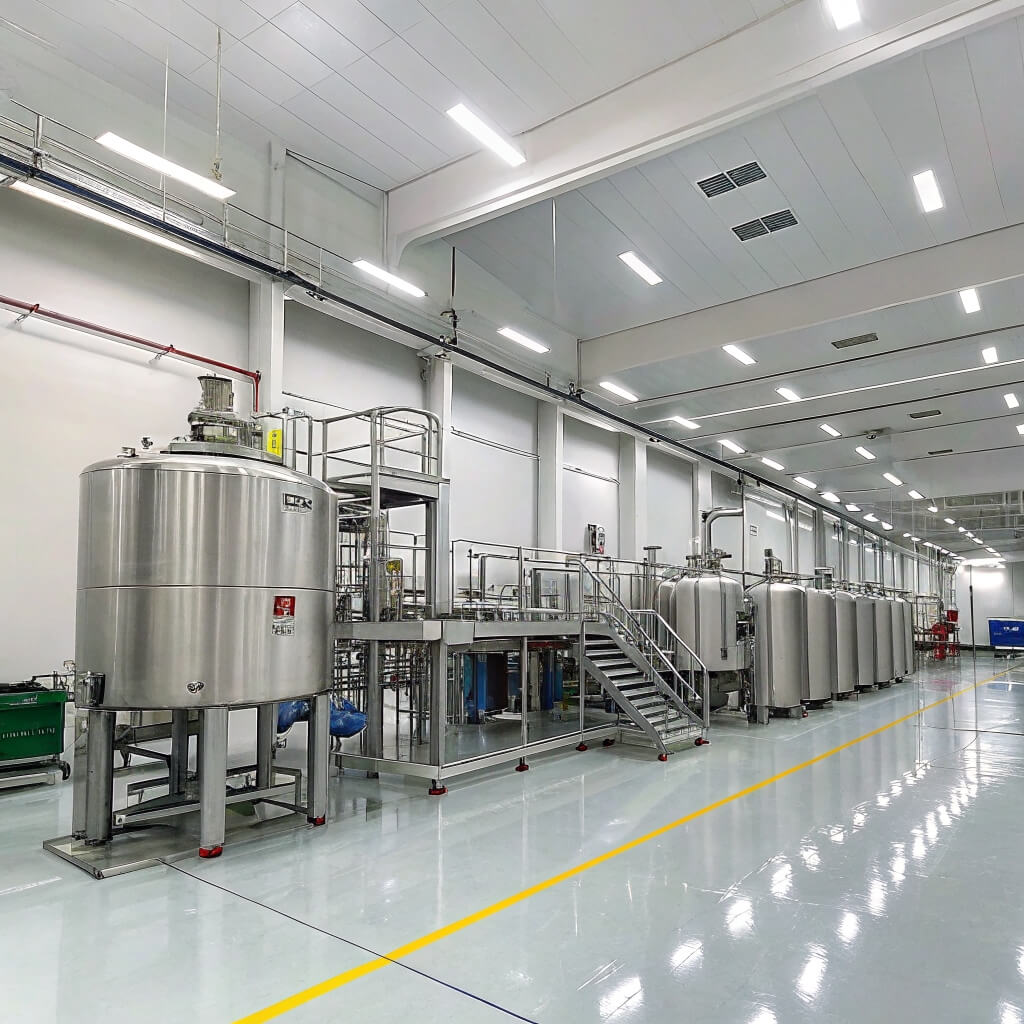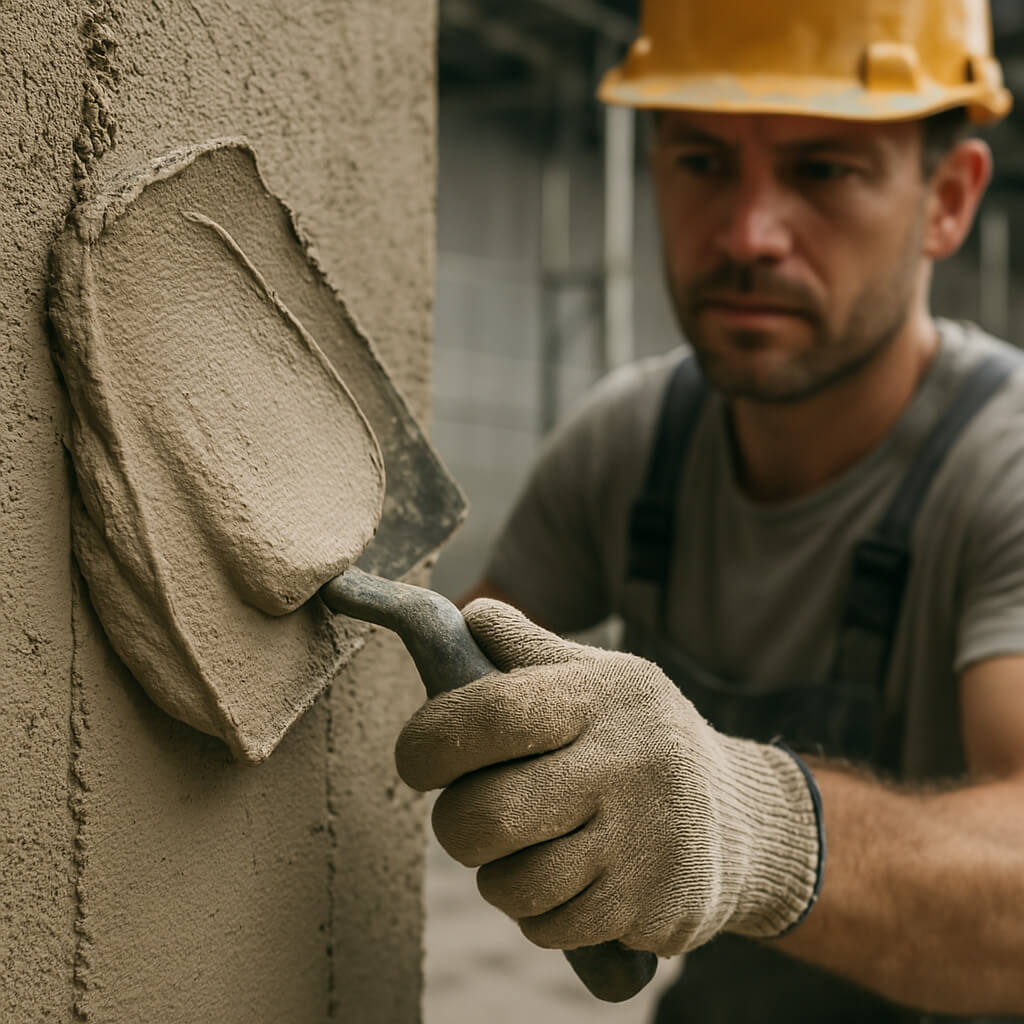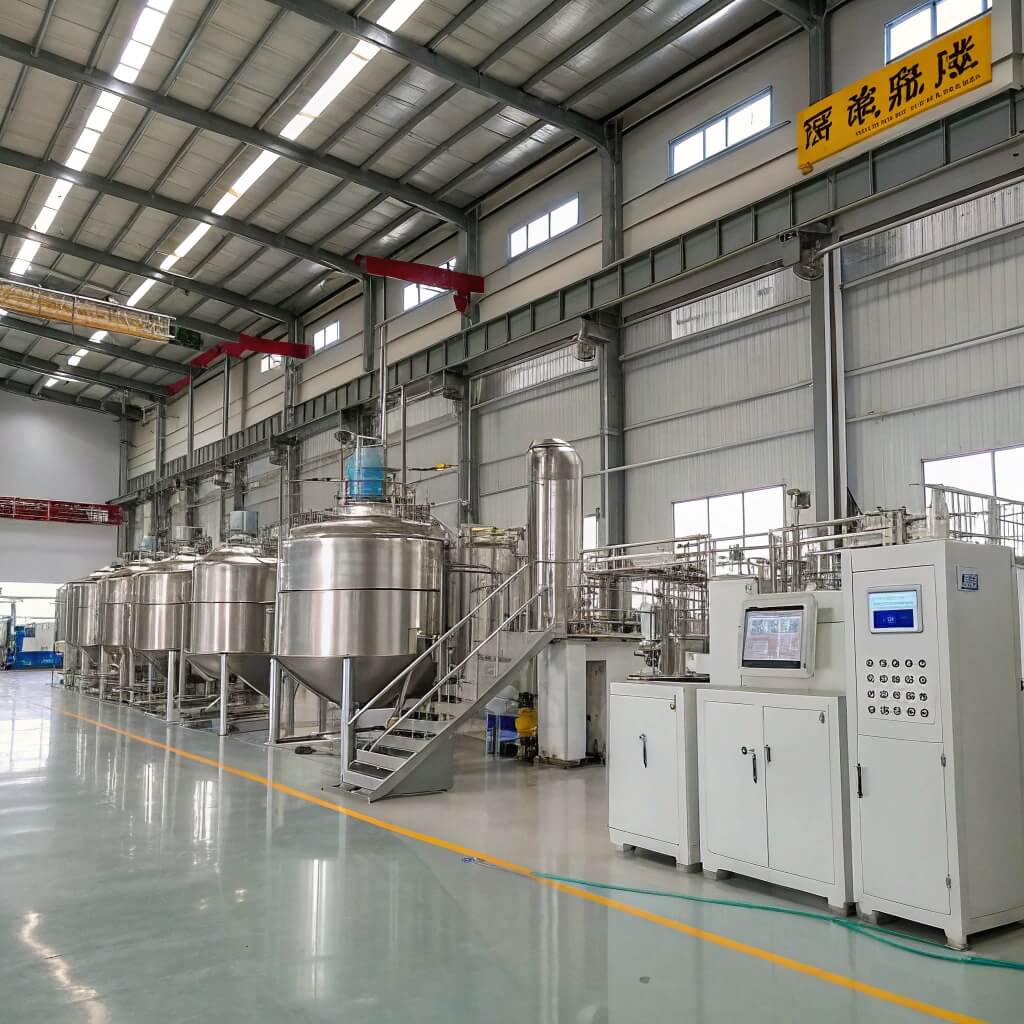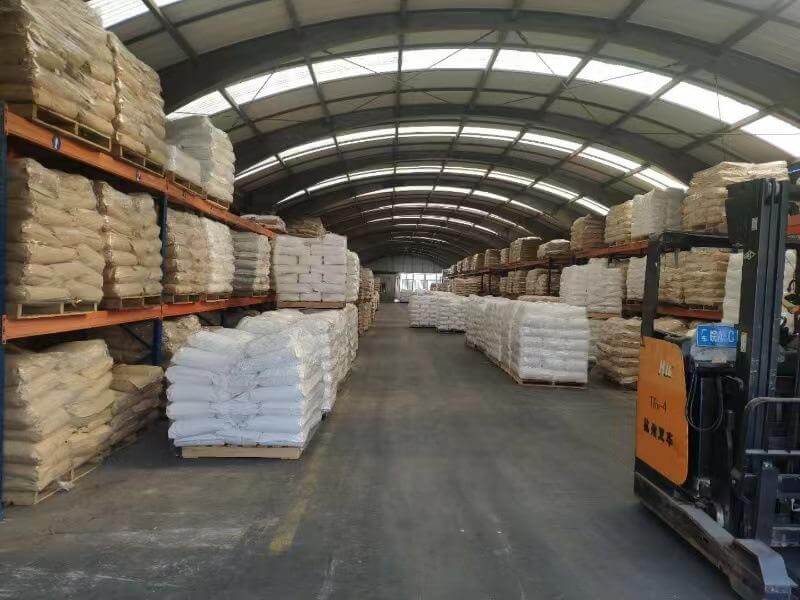Finding a top-tier HPMC manufacturer can seem like searching for a needle in a haystack, with so many suppliers claiming superior quality and service.
The leading HPMC manufacturers combine production capacity, quality control systems, technical support capabilities, and global distribution networks to serve diverse industries from construction to pharmaceuticals.
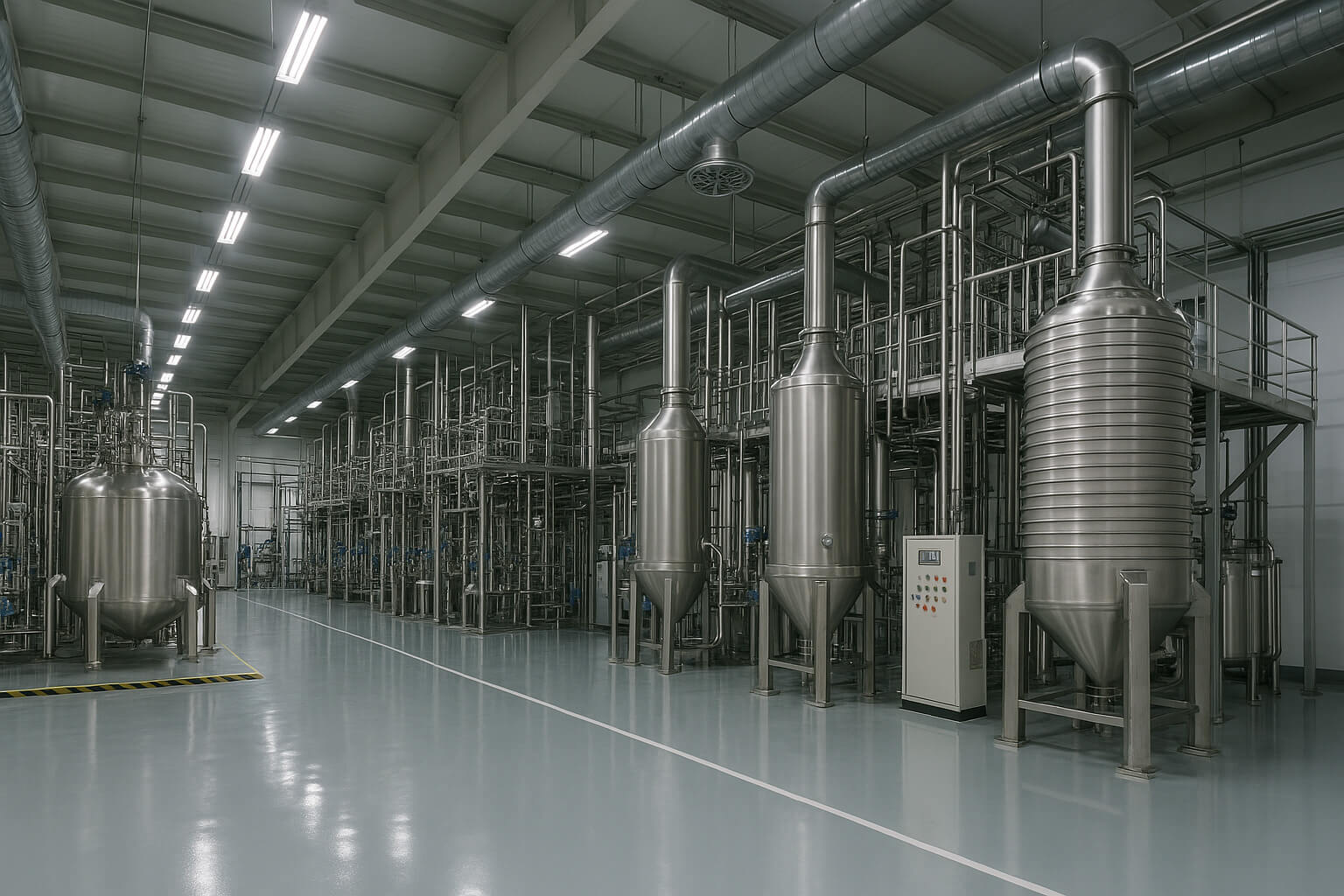
A modern HPMC manufacturing facility with advanced production equipment showing clean, efficient processing lines for high-quality hydroxypropyl methylcellulose.
Let’s look deeper at what makes certain producers stand out in this competitive market.
What defines a top HPMC manufacturer?
Many buyers get stuck with unreliable suppliers because they don’t know what truly makes an HPMC manufacturer exceptional.
A top HPMC manufacturer demonstrates production capacity exceeding 10,000 tons annually, maintains ISO and industry-specific certifications, provides consistent batch-to-batch quality, offers customization options, and delivers solid technical support for application challenges.
Several factors set industry leaders apart from average suppliers in the HPMC market. We’ve been producing HPMC for over a decade and have identified key differentiators that truly matter when evaluating manufacturers:
Production Scale and Capacity
The most reliable HPMC manufacturers maintain large-scale production facilities with annual capacities of at least 10,000 tons. This scale enables them to fulfill large orders consistently without supply disruptions. In our experience, manufacturers with smaller production capacities often struggle with delivery timelines during peak demand seasons, particularly for construction-grade HPMC.
At Morton, our 30,000-ton annual capacity allows us to maintain steady supply even during construction boom periods. Production scale also directly influences a manufacturer’s ability to optimize costs through economies of scale – an important consideration for buyers seeking consistent pricing.
Quality Control Systems
Leading manufacturers implement comprehensive quality management systems that comply with international standards such as ISO 9001 and industry-specific certifications like USP, EP, or JP for pharmaceutical applications. These systems involve rigorous testing at multiple production stages and final product verification.
The best manufacturers maintain in-house laboratories with advanced testing equipment for measuring viscosity, substitution degree, particle size, and other critical parameters. Our quality control procedures include multiple checkpoint inspections during each production run to catch deviations before they affect final product quality.
Technical Expertise and Support
Top-tier HPMC producers employ technical specialists who understand both the chemical properties of HPMC and its application-specific requirements. This expertise allows them to provide valuable guidance on product selection, formulation adjustments, and troubleshooting.
When we work with construction material producers, our technical team conducts compatibility tests with their specific cement formulations to recommend the optimal HPMC grade. This level of technical support distinguishes leading manufacturers from mere commodity suppliers.
| Factor | Industry Leader Characteristics | Average Supplier Characteristics |
|---|---|---|
| Production Capacity | 10,000+ tons annually | Under 5,000 tons annually |
| Quality Control | In-house labs, multiple testing points | Basic testing only, often outsourced |
| Technical Support | Application specialists, formulation assistance | Limited technical knowledge, generalized recommendations |
| Customization | Flexible viscosity, particle size, substitution degree | Standard products only |
| Supply Reliability | Stable year-round supply, emergency stock | Seasonal capacity limitations |
Choosing a manufacturer with these qualifications ensures you receive not just a product but a complete solution backed by expertise and reliability. The best HPMC suppliers recognize that their success depends on their customers’ success.
How do Chinese HPMC manufacturers dominate the global market?
Many Western buyers doubt Chinese HPMC quality, yet China now produces over 70% of global supply and exports to stringent markets worldwide.
Chinese HPMC manufacturers have achieved market dominance through massive production scale, competitive pricing without sacrificing quality, advanced etherification technology, strong supply chain integration, and strategic export focus targeting construction and pharmaceutical markets globally.
The global HPMC market has shifted dramatically over the past two decades. Chinese manufacturers have emerged as dominant players, transforming from low-cost alternatives to industry leaders. As a Chinese manufacturer with over 10 years in the industry, we’ve witnessed this transformation firsthand.
The rise of Chinese HPMC producers stems from key advantages. First, China’s chemical industry infrastructure provides access to raw materials at scale. This foundation has allowed manufacturers like Morton to build production facilities with capacities exceeding 30,000 tons annually – far larger than many Western counterparts.
Technological advancement has been another crucial factor. Chinese manufacturers have invested heavily in modern etherification technology and automation. These investments have resulted in products meeting international standards while maintaining cost advantages. We’ve implemented continuous production lines that minimize batch variations.
Strategic export focus has strengthened Chinese manufacturers’ position. While initially focusing on construction-grade HPMC, many Chinese producers have expanded into pharmaceutical and food-grade products, opening new markets globally.
Industry analysis shows Chinese manufacturers now account for approximately 70% of global HPMC production capacity, with exports to North America, Europe, and the Middle East growing at 15% annually.
Supply chain integration has also played a significant role. Many leading Chinese manufacturers have established direct relationships with cellulose suppliers and control their etherification agent production. This vertical integration ensures consistent raw material quality.
| Advantage | Impact on Market Position |
|---|---|
| Production Scale | Enables large international orders and stable supply |
| Technology Investment | Narrows quality gap with Western producers |
| Cost Structure | 15-30% lower costs than European/US manufacturers |
| Export Networks | Distribution in 100+ countries with localized logistics |
Despite these advantages, Chinese manufacturers still face challenges in certain high-specification segments. However, continuous improvement in production technology is steadily eroding these remaining barriers.
What are the global leaders among HPMC suppliers?
Buyers often struggle to identify truly reliable HPMC suppliers among countless options, risking product inconsistency and supply chain disruptions.
The global HPMC market features established Western companies like Dow Chemical and Ashland with premium pricing, major Chinese producers including Hopetide and Morton offering strong value, Japanese specialists focusing on high-purity grades, and Indian manufacturers competing primarily on cost.
The global landscape of HPMC manufacturers includes companies from diverse regions, each with distinct strengths. Understanding these differences helps buyers make informed sourcing decisions.
Western manufacturers like Dow Chemical and Ashland were early HPMC pioneers and maintain significant market presence. These companies focus on high-specification grades for pharmaceutical and food applications, where regulatory compliance is crucial. Their products command premium prices justified by technical support and regulatory approvals.
Chinese manufacturers have emerged as volume leaders, with companies like Hopetide, Mejoyo, and our own Morton factory representing major production capacity. Chinese suppliers offer competitive pricing while maintaining quality standards suitable for most applications. The best Chinese manufacturers have invested in technology and quality systems that rival Western counterparts.
Our pharmaceutical-grade HPMC now meets USP and EP standards for regulated applications, while our construction grades offer performance comparable to Western alternatives at competitive prices.
Japanese manufacturers have carved out specialized niches focusing on ultra-high-purity grades. Indian suppliers have expanded their presence, primarily competing on price in less technically demanding applications, though quality consistency remains a challenge for smaller producers.
When evaluating global suppliers, buyers should consider the total value package:
• Quality consistency across batches
• Technical support capabilities
• Supply reliability during peak demand
• Documentation and regulatory compliance
• Customization flexibility
Regional preferences often influence supplier selection. European pharmaceutical companies typically value documentation and regulatory history, while construction companies in emerging markets prioritize cost-effectiveness and application support.
| Region | Key Manufacturers | Typical Strengths | Common Applications |
|---|---|---|---|
| Western | Dow, Ashland | Documentation, consistency | Pharmaceuticals, food |
| China | Morton, Hopetide | Value, scale, technical capability | Construction, pharmaceuticals |
| Japan | Shin-Etsu | Specialized grades, high purity | High-end pharmaceuticals |
| India | Various producers | Competitive pricing | Basic construction |
The HPMC landscape continues to evolve, with Chinese producers expanding into higher-specification markets and Western manufacturers focusing on specialized grades to maintain their positions.
How do manufacturers ensure HPMC quality and consistency?
Many users suffer product failures from batch variation in HPMC, causing costly reformulations and production delays.
Leading HPMC manufacturers ensure quality through multi-stage raw material testing, precisely controlled etherification reactions using automated systems, comprehensive in-process quality monitoring, strict final product testing for viscosity and substitution degree, and retention of reference samples for ongoing stability studies.
Quality control represents the most critical differentiator among HPMC manufacturers. Consistency between batches directly impacts the performance of end products. At Morton, our quality control system has evolved through years of manufacturing experience.
The quality journey begins with raw material selection. Cellulose purity significantly influences final HPMC characteristics. We test each cellulose batch for moisture content, purity, degree of polymerization, and fiber characteristics before accepting it.
The etherification process represents the most critical production stage. This chemical reaction must occur under precisely controlled conditions to achieve the desired substitution pattern. Modern manufacturers utilize automated reaction systems with multiple monitoring points for temperature, pressure, and reagent ratios.
In our facility, automated systems maintain reaction parameters within narrow tolerances, with deviations triggering immediate alerts. This prevents quality issues that plague manufacturers using less sophisticated equipment.
Post-reaction processing also influences final product characteristics. Washing efficiency affects residual reagent content, while drying conditions impact particle structure and moisture content.
Final product testing forms the last quality control barrier before shipping. Testing includes:
• Viscosity measurement
• Substitution degree verification
• Particle size distribution analysis
• Gel temperature determination
• Application-specific performance tests
We maintain reference samples from each batch, enabling traceability and comparative testing should customers report inconsistencies.
| Quality Control Stage | Key Parameters | Impact on Performance |
|---|---|---|
| Raw Material Testing | Cellulose purity | Affects product purity |
| Etherification Control | Temperature, reagent ratios | Determines substitution pattern |
| Washing Process | Water purity, cycles | Influences product safety |
| Final Testing | Viscosity, particle size | Confirms specifications |
Digital quality management systems enhance consistency by enabling trend analysis across hundreds of batches. By analyzing historical data, manufacturers can identify process drift before it causes specification deviations.
Advanced manufacturers also conduct application testing that simulates customer use conditions. For construction grades, this includes preparing mortar samples to verify open time and adhesion strength. For pharmaceutical grades, dissolution profile testing confirms batch-to-batch consistency.
What should buyers consider when sourcing from HPMC factories?
Many procurement teams focus solely on price, only to discover hidden costs in quality issues, supply delays, and technical incompatibility with their applications.
When sourcing HPMC, buyers should evaluate factories based on actual production capacity verified through site visits, comprehensive quality certifications relevant to their application, detailed technical data sheets with clear specifications, supplier financial stability for long-term reliability, and application-specific testing that simulates their use conditions.
Selecting the right HPMC supplier involves more than price comparison. Based on our experience with global customers, we’ve identified key sourcing considerations.
First, verify the manufacturer’s actual production capacity. Large capacity indicates both supply security and production expertise. During factory visits, look for multiple production lines and inventory levels. We encourage potential partners to tour our 30,000-ton facility to verify our capabilities firsthand.
Quality certification appropriate to your application is essential. For construction, ISO 9001 provides a baseline, while pharmaceutical applications require GMP compliance and approvals like USP or EP. Food applications demand food safety certifications like FSSC 22000.
Technical specifications deserve close scrutiny. Reputable manufacturers provide detailed data sheets with clearly defined parameters. For construction-grade HPMC, viscosity tolerance ranges should be specified. Pharmaceutical grades should include information on substitution degree and purity limits.
Supply reliability becomes evident through a manufacturer’s export history and reference checks. Ask about their major markets and long-term customer relationships. Suppliers with established global distribution indicate quality acceptance and logistical capability.
We recommend requesting samples for application testing before placing bulk orders. For construction applications, prepare test mortars to evaluate open time and water retention. For pharmaceutical applications, conduct dissolution studies.
Customization flexibility often distinguishes premium suppliers from commodity producers. Top manufacturers can adjust key parameters to match specific application requirements.
| Evaluation Factor | Questions to Ask | Red Flags |
|---|---|---|
| Production Capacity | Annual volume, production lines? | No factory visits allowed |
| Quality System | Relevant certifications? | Expired documentation |
| Technical Support | Specialist availability, response time? | Inability to answer technical questions |
| Customer References | Long-term customers in your industry? | Only short-term relationships |
Price considerations should include total landed cost including shipping, customs, and potential reformulation expenses if the product doesn’t perform as expected. Lower initial prices often lead to higher total costs when quality issues arise.
Finally, evaluate communication capability. Clear, responsive communication prevents misunderstandings and expedites problem resolution. A supplier’s willingness to accommodate your purchasing procedures indicates a customer-focused approach.
How do HPMC suppliers support different application industries?
Many manufacturers claim to serve all industries but lack the specialized knowledge needed for optimal product performance in specific applications.
Top HPMC suppliers support diverse industries by providing construction-specific grades optimized for workability and water retention, pharmaceutical grades meeting USP/EP standards with documentation, food-grade HPMC with proper safety certifications, and personal care grades with specialized dissolution profiles for their unique formulations.
HPMC applications vary dramatically across industries, requiring manufacturers to develop specialized knowledge. The best suppliers don’t just sell a chemical – they provide application-specific solutions backed by expertise.
In construction, HPMC functions primarily as a water retention agent and rheology modifier in cement-based products. Leading suppliers understand how cement chemistry interacts with HPMC and how factors like cement type and mixing methods affect performance.
When working with construction clients, we conduct compatibility testing with their specific cement formulations to recommend optimal HPMC grades. This approach has helped customers solve common issues like insufficient open time. Our construction-grade HPMC undergoes workability testing in standard mortar formulations to verify performance.
For pharmaceutical applications, regulatory compliance and documentation become paramount. Top suppliers maintain Drug Master Files with regulatory authorities and provide detailed documentation. Pharmaceutical-grade HPMC requires tighter specifications for parameters like heavy metals and microbial limits.
Our pharmaceutical division produces USP and EP compliant grades with full documentation packages and regulatory support. This approach helps pharmaceutical clients navigate regulatory requirements while ensuring consistent product performance in tablet formulations and controlled-release matrices.
Food applications demand both regulatory compliance and sensory acceptability. HPMC used in food must meet safety standards while providing desired textural properties without off-flavors. For personal care applications, dissolution profile and compatibility with common formulation ingredients become critical factors.
| Industry | Critical HPMC Properties | Supplier Support Requirements |
|---|---|---|
| Construction | Water retention, workability | Compatibility testing, field support |
| Pharmaceuticals | Dissolution profile, purity | Regulatory documentation, stability data |
| Food | Gelation temperature, texture | Food safety certification, recipe support |
| Personal Care | Rheology, film-forming | Formulation assistance, sensory evaluation |
Industry-specific technical support represents another key differentiator. Top manufacturers employ specialists with backgrounds in construction materials, pharmaceutical formulation, food technology, or cosmetic science who understand customer applications.
The best suppliers maintain application laboratories equipped to simulate customer processes. These facilities allow them to troubleshoot issues, develop customized grades, and provide hands
FAQs
Who is the manufacturer of HPMC?
HPMC is manufactured by multiple companies globally. Major producers include Dow Chemical and Ashland in Western markets, Morton and Hopetide in China, and Shin-Etsu in Japan. Each manufacturer offers different grades optimized for construction, pharmaceutical, food, or industrial applications. The choice depends on your specific requirements for viscosity, substitution degree, and regulatory compliance needs.
Which is better, CMC or HPMC?
Neither CMC nor HPMC is universally "better" – each serves different applications better. HPMC offers thermal gelation, better salt tolerance, and broader pH stability (2-12), making it superior for pharmaceutical applications and construction materials. CMC provides higher transparency in solutions and stronger binding properties, making it preferred in some food applications and paper production. Your specific application determines the optimal choice.
Where do HPMC capsules come from?
HPMC capsules primarily come from specialized manufacturers in China, India, Japan, and Europe who focus on pharmaceutical excipients. Leading producers include Capsugel (now Lonza), Qualicaps, Suheung, ACG Worldwide, and several Chinese manufacturers including some divisions of major HPMC producers. These manufacturers convert pharmaceutical-grade HPMC into capsule shells under Good Manufacturing Practice (GMP) conditions to ensure patient safety.
Is HPMC FDA approved?
Yes, HPMC is FDA approved for various applications. For pharmaceuticals, it’s recognized as a safe excipient under USP/NF monographs. For food applications, HPMC is approved as a food additive (E464 in Europe) with GRAS (Generally Recognized As Safe) status. However, each manufacturer’s specific HPMC grade must comply with relevant purity standards and specifications for its intended use. Always verify that your supplier’s grade has appropriate regulatory clearance.
What conclusions can be drawn from our discussion?
The global HPMC manufacturing landscape features diverse suppliers varying widely in capabilities, specialization, and value proposition. Selecting the right manufacturer requires looking beyond price to evaluate quality systems, technical support, customization capabilities, and industry-specific expertise.
As we’ve seen, leading manufacturers distinguish themselves through production scale, quality management, technical knowledge, and application support. Chinese manufacturers have significantly evolved their capabilities, now offering competitive alternatives to traditional Western suppliers across most applications.
For buyers, conducting thorough supplier evaluation including site visits, sample testing, and reference checks represents time well invested. The right manufacturing partner provides not just a product but a complete solution that enhances your formulations and production processes. Contact Morton today to discuss your specific HPMC requirements and experience the difference that a dedicated manufacturer can make to your product quality and business success.

